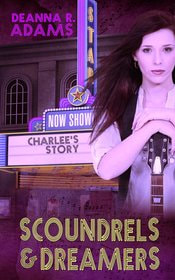 I've gotten questions about writing historical fiction vs. non-fiction. What's the difference, and are there any rules? I turned to Deanna Adams for answers. Writers need trusted advisors and for many in Northeast Ohio, Deanna, published author, mentor and coordinator of writer's workshops is that person. She provides her insights having published historical fiction, non-fiction, and memoir. Guest Blog by Author Deanna Adams Changing genres First of all, thank you for having me on your blog, Ann! As you know, I started out as a journalist, writing nonfiction and my first three titles are nonfiction: Rock ’n’ Roll and the Cleveland Connection, Confessions of a Not-So-Good Catholic Girl (collection of memoirs) and Cleveland’s Rock and Roll Roots (an illustrative history). The decision to write fiction wasn’t a new one. In my early years, I wrote short stories—that I was too shy and insecure to submit anywhere—and one failed attempt at a novel. In the ’90s, I was freelancing, and after doing a few articles on the subject of rock and roll, I thought maybe I should write a book on Cleveland’s illustrious rock music history. So that became my first book, published by Kent State University Press. I then went into my creative nonfiction period, in which I wrote my “Confessions,” then was commissioned to do the other rock book for Arcadia Press. By then, it was 2011 and I was ready to explore something different. I wanted to do what I call the “Forrest Gump” thing—take fictional characters and weave them through history, namely baby boomer history. And because I was now known as a pop culture/rock writer, I knew I should stick with my “brand.” So I wrote about a teenaged girl in 1957 who becomes pregnant by her first love, who is on his way to rock and roll stardom. I wanted this book to be “women’s fiction” as opposed to romance, the difference being that women’s fiction focuses more on women’s issues, and when a young, unmarried, girl got “knocked up” in this era, that was definitely an “issue” back in the ’50s and ’60s. It was the worst thing that could happen to the whole family. Therein lied my premise. Other Perspectives But guess what? Even though I’d been a writer for decades, this was an entirely different art form than nonfiction. For a year and a half, I worked on the first draft, developing the plot, fleshing out the characters, and keep the tension/conflict/story problem going throughout the book, all the while writing without my usual “authoritative voice,” as used in nonfiction. Luckily, I have a writer friend who reads and writes nothing but fiction (and is an editor!) and vetted that first manuscript. As a result, I ended up making many changes in the second draft. I wrote two more drafts, tweaking each time, before sending it out to publishers. I then went on to write a sequel to that book, Scoundrels & Dreamers, which was a bit easier to write because I’d already written that first novel. So when it comes to “rules,” I’d just say that it’s important to stay true to the genre. In order to do that, you must read and study that genre. And always, keep your reader in mind, no matter what you write. Lastly, have a passion for the subject, be it fiction or nonfiction. That dedicated interest keeps your writing fresh and interesting and keeps you from being bored with what you’re writing. After all, if the writer is bored, guaranteed your reader will be! This is why classes, workshops and conferences are so important. I particularly love writing retreats. We all need to get away from jobs, kids, responsibilities, and taking off, even for just a weekend, to concentrate on your craft is the best favor you can do for yourself. I love going to retreats of all kinds, as much as I love hosting them. I have written my best “stuff” while away from everything, and I’ve met some awesome writers who have become friends. That’s probably the best advice I can give writers: Learn from others, write as much as you can, and whether you want to write fiction or nonfiction—even if you have natural talent—writing is an art that needs to be learned and practiced, in order to be the best writer you can be. It’s hard work, but the more you work at it, the better writer you become. For more information about Deanna, see her website, www.deannaadams.com Next Time: Addison Hartle, May 17, 1911
0 Comments
Leave a Reply. |
Archives
August 2020
Categories
All
|
 RSS Feed
RSS Feed